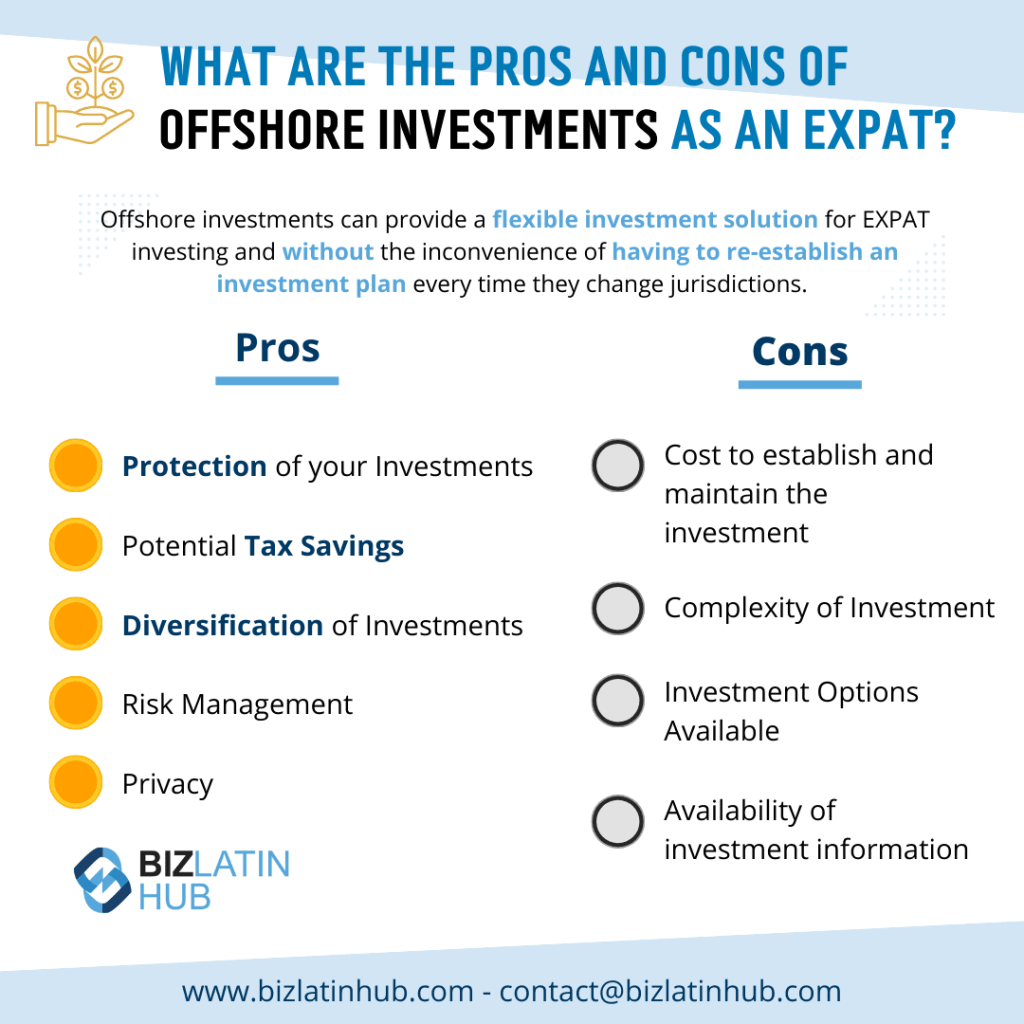Why Offshore Investment Plays a Critical Duty in International Wealth Administration
Why Offshore Investment Plays a Critical Duty in International Wealth Administration
Blog Article
Just How Offshore Financial Investment Works: A Step-by-Step Failure for Capitalists
Offshore financial investment provides an organized pathway for capitalists seeking to optimize their financial approaches while leveraging worldwide chances. The procedure begins with the careful option of a territory that straightens with a financier's goals, followed by the establishment of an account with a qualified overseas organization.

Comprehending Offshore Financial Investment
Comprehending offshore financial investment involves identifying the strategic benefits it supplies to people and firms looking for to maximize their financial portfolios. Offshore financial investments generally describe assets kept in a foreign territory, typically characterized by positive tax programs, governing atmospheres, and personal privacy defenses. The primary purpose behind such investments is to improve resources growth, diversity, and danger monitoring.

Financiers can access a vast variety of economic instruments through offshore places, consisting of stocks, bonds, mutual funds, and realty. These investments are frequently structured to follow regional regulations while giving adaptability in regards to asset allocation. Additionally, offshore financial investment strategies can enable companies and people to hedge against domestic market volatility and geopolitical risks.
One more key facet of offshore financial investment is the capacity for enhanced privacy. An extensive understanding of both the obligations and benefits connected with overseas financial investments is necessary for educated decision-making.
Advantages of Offshore Investing
Investors typically turn to offshore spending for its many benefits, consisting of tax obligation efficiency, possession protection, and profile diversification. Among the primary advantages is the capacity for tax obligation optimization. Many offshore territories supply beneficial tax obligation regimens, allowing investors to lawfully minimize their tax obligation liabilities and maximize returns on their investments.
Furthermore, overseas accounts can supply a layer of property security. Offshore Investment. By positioning properties in politically stable jurisdictions with strong privacy legislations, financiers can secure their wide range from prospective legal insurance claims, financial institutions, or financial instability in their home nations. This kind of defense is specifically interesting high-net-worth people and business owners encountering litigation risks
Furthermore, offshore investing facilitates portfolio diversification. Accessing international markets allows capitalists to explore possibilities in different property classes, consisting of realty, supplies, and bonds, which might not be readily available locally. This diversification can lower total profile risk and boost prospective returns.
Ultimately, the advantages of overseas investing are engaging for those looking for to optimize their monetary techniques. However, it is critical for investors to extensively comprehend the implications and laws connected with offshore investments to guarantee conformity and achieve their monetary goals.
Picking the Right Territory
Selecting the suitable territory for offshore investing is an important choice that can significantly influence a capitalist's financial method. The ideal jurisdiction can provide various benefits, including favorable tax structures, asset security legislations, and regulative environments that line up with a capitalist's objectives.
When choosing a territory, consider variables such as the political stability and financial health of the country, as these aspects can affect investment safety and security and returns. The lawful framework surrounding international investments must be assessed to guarantee compliance and security of assets. Nations known for durable lawful systems and transparency, like Singapore or Switzerland, often infuse better confidence amongst financiers.
In addition, assess the tax ramifications of the territory. Some countries supply eye-catching explanation tax incentives, while others might enforce strict reporting needs. Understanding these nuances can help in optimizing tax obligation responsibilities.

Steps to Establish an Offshore Account
Establishing an offshore account involves a collection of systematic steps that ensure compliance and security. The first step is choosing a trusted overseas banks, which ought to be licensed and controlled in its jurisdiction. Conduct thorough research study to examine the establishment's reputation, services supplied, and customer testimonials.
Following, collect the necessary paperwork, which generally includes recognition, evidence of address, and info pertaining to the source of funds. Various jurisdictions might have differing needs, so it is essential to verify what is required.
When the documents is prepared, start the application procedure. This might entail submitting forms on-line or face to face, depending upon the establishment's methods. Be prepared for a due diligence procedure where the bank will certainly validate your identity and assess any kind of possible risks connected with your account.
After approval, you will certainly get your account information, allowing you to fund your overseas account. It is a good idea to keep clear documents of all purchases and abide by tax obligation laws in your house nation. Developing the account properly sets the foundation for reliable overseas financial investment monitoring in the future.
Taking Care Of and Checking Your Investments
When an offshore account is successfully established, the emphasis moves to handling and monitoring your financial investments properly. This essential stage includes a methodical approach to guarantee your properties line up with your financial objectives and take the chance of resistance.
Begin by developing a clear investment strategy that details your goals, whether they are prime preservation, revenue generation, or growth. Routinely review your profile's performance against these benchmarks to evaluate whether modifications are required. Utilizing monetary management tools and platforms can facilitate real-time tracking of your investments, giving understandings right into market patterns and asset allocation.
Involving with your overseas economic expert is essential. They can provide proficiency and advice, aiding you browse complex regulatory environments and worldwide markets. Schedule periodic evaluations visit this page to talk about efficiency, analyze market problems, and rectify your method as required.
In addition, continue to be informed regarding geopolitical advancements and economic indications that may impact your investments. This aggressive strategy allows you to react promptly to transforming scenarios, guaranteeing your overseas profile continues to be durable and lined up with your investment objectives. Ultimately, diligent management and recurring surveillance are essential for taking full advantage of the benefits of your offshore investment approach.
Verdict
In verdict, overseas financial investment uses a calculated avenue for portfolio diversification and danger monitoring. Continued surveillance and cooperation with financial advisors stay necessary for maintaining an agile financial investment technique in an ever-evolving global landscape.
Offshore financial investment offers an organized pathway for financiers seeking to enhance their monetary approaches while leveraging international chances.Understanding overseas investment entails recognizing the calculated advantages it offers to people and firms looking for to enhance their financial profiles. Offshore financial investments typically refer to assets held in a foreign jurisdiction, commonly characterized by beneficial tax obligation routines, regulatory settings, and privacy protections. Furthermore, offshore financial investment techniques can make it possible for organizations and individuals to hedge versus domestic market volatility and geopolitical threats.

Report this page